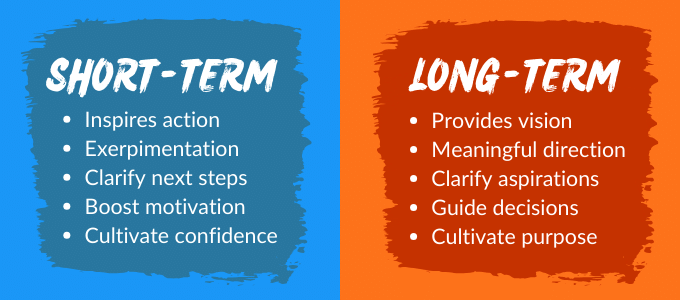Short-term goals increase motivation and self-confidence, propelling you toward success and fulfillment.
They’re a powerful weapon to realize your dreams.
But they’re also surprisingly effective for rapid experimentation. Think about trying new side hustles, testing a marketing strategy, or exploring new sports and hobbies.
But…
You must set short-term goals the right way. And the New Year’s resolution statistics show why:
64% Quit their goals within a month.
While short-term goals should boost confidence, failing to set effective targets leads to frustration and crushes self-esteem.
So, how can you avoid that?
In this article, you’ll learn effective methods to set immediate goals that create momentum. And we’ll cover short-term goal examples to inspire you to set your own.
So, let’s dive in!
- Definition of a short-term goal
- Importance of short-term goals
- 5 Benefits of short-term goals
- Setting good short-term goals
- 121 Short-term goal examples
- Tracking short-term goals
What is a short-term goal?
A short-term goal is a specific and realistic objective that you can achieve within 12 months. Popular types include weekly goals, monthly goals, and quarterly goals.
Some examples of short-term goals include:
- Completing a project by the end of the week.
- Exercising three times per week for a month.
- Learning a high-income skill this quarter.
What’s the key difference between short-term and long-term goals?

Short-term objectives are more specific and should feel achievable in the near future, whereas long-term goals are more aspirational and can feel intimidating.
But…
Why is it important to have short-term goals?
Short-term goals are important because they clearly define what to focus on. Immediate goals also create a sense of urgency, driving action.
Making continuous progress and achieving tiny milestones feels good, fueling motivation and self-confidence.
In other words, short-term goals fuel consistent success.
While long-term goals provide purpose and direction, short-term goals are effective in breaking up these aspirational objectives into smaller and more manageable chunks.
Short-term goals help you turn your dreams into reality.
Benefits of short-term goals
While we covered the importance of goal-setting, here are the specific benefits of short-term goals:
- Overcome procrastination: Clear and small milestones reduce overwhelm and increase focus. They also expire soon, creating urgency and inspiring immediate action.
- Stay motivated: Making consistent progress is rewarding and encourages you to keep moving forward.
- Gain self-confidence: Achieving one victory after the other instills self-belief, empowering you to face bigger challenges.
- Increase personal fulfillment: Goal achievement contributes to life’s satisfaction and creates a pattern of continuous success.
- Experiment: Setting short-term career goals is an excellent way to try different strategies, test projects, and new skills. In addition, you can use it to explore your passions and interests. For example, I used a 3-month goal to learn the basics of JavaScript to determine how much I would enjoy it.
Now, you’ll only reap those benefits if you set effective short-term goals.
So…
How to set a good short-term goal?
Remember: Setting short-term goals should boost clarity, motivation, and confidence.
You can use them to break up long-term objectives or as standalone personal goals and experiments.
Either way, they should follow the SMART principles of goal-setting.
SMART short-term goals
SMART stands for Specific, Measurable, Achievable, Relevant, and Timely. Here’s what you should emphasize with short-term goals:
- Make them ultra-specificity: Specific goals provide clarity on what you should do to achieve your goal. It drives action. For example, rather than lose 2 pounds this month, set a goal to lose 2 pounds this month by going to the gym for 45 minutes, 4 times each week.
- Make it super easy to measure: Tracking progress increases motivation. So instead of setting a goal to lose weight this month, set a specific target to lose 2 pounds this month. You can make it even more measurable with this goal: Eat 60,000 calories this month. This last version translates into easily measurable weekly and daily goals and is the most trackable.
- Achievability: Realistic goals reduce procrastination and drive action. Using process goals is one effective method. Consider the difference between making 50 sales calls versus making 2 sales. Of course, you want the desired outcome. That said, only action-oriented goals are 100% within your control. They’re most achievable and more likely to keep you motivated.
- Relevance: You’ll find it much easier to persist through boring and challenging times if your goals deeply resonate with you. How do your small objectives contribute to your greater aspirations and personal fulfillment? Why do you care about it? The more authentic the answer feels to you, the more likely you are to succeed.
- Timely: Short-term goals have immediate deadlines by definition – or it wouldn’t be short-term. Set deadlines that create a sense of urgency without making the target feel unachievable.

By following these steps, you not only set effective short-term goals but they also become your action plan. Then, taking action is next.
But before you do, here are a couple…
More tips to empower short-term goal success
Do you want to create even more leverage to succeed? Here are 3 extra tips for short-term goal achievement:
- Written goals increase clarity and focus. So write down your goals in one of the best physical goal planners. Alternatively, learn more about the software I use in my review of Goals on Track.
- Build habits. Consistent routines reduce your need for willpower and motivation. That’s why you should identify habits around your goals. For example, writing a blog post is my recurring weekly goal. So, I made writing an important part of my morning routine.
- Leverage rewards: Use the power of dopamine to your advantage by rewarding yourself for the actions you take (not just outcomes). Rewarding the action – regardless of the result – creates a neural connection between the act and pleasure, solidifying the habit.
That’s pretty much all you need to know for setting and achieving short-term personal goals.
Now, let’s dive into…
121 Transformative short-term goal examples
The possibilities of short-term goals are endless.
And there’s no one-size-fits-all approach.
That’s why I recommend trying a bunch of different goals to see which ones inspire you the most.
If you’ve already got life goals, use the following examples of short-term goals as inspiration to break them up into smaller targets.
And if you don’t have dreams yet, pick a small goal from the list below. Pursuing any goal will generate clarity and self-awareness. And it’ll motivate you to set new goals.
Now, let’s dive into some examples of short-term goals.

Short-term personal goals
- Read: Read one of my book recommendations this month.
- Growth: Complete the Ultimate Personal Development Course in the next 60 days to kick-start your journey to self-mastery.
- Study: Research master’s programs that are a good fit for your interests and career objectives in the next 2 weeks.
- Language: Take a daily lesson on RocketLanguages for 3 months to learn a new conversation each week in a new language.
- Meditate: Meditate for 10 minutes every morning for 2 weeks.
- Routine: Try a new morning routine idea this week.
- Gratitude: Write down three things you’re grateful for every evening before bed for the next 3 weeks.
- Organize: Declutter and organize one room in the house each weekend for the next month.
- Creativity: Spend 30 minutes each day working on a personal creative project for the next two weeks.
- Hobby: Explore 3 new hobbies in the next 30 days.
- Experiment: Try a new activity or adventure this month.
- Screen time: Limit daily screen time to 1 hour for 30 days.
- Self-reflect: Write in The Five Minute Journal each night for 45 days.
- Introspect: Take one of the best personality tests this week.
- Journal: Write about your goals, experiences, thoughts, and feelings for 30 minutes each week for 3 months.
- Goal-setting: Set daily goals every evening this quarter.
- Self-talk: Only speak positively about yourself this week. And when you catch yourself speaking negatively, take a moment to challenge them and transform your words into a positive.
- Music: Play an instrument for 15 minutes per day for 3 months.
- Skills: Learn a new skill that interests you in the next 30 days.
- Write: Start a personal blog and write a short daily story or lesson for the next 60 days.
- Travel: Explore a new city by yourself this month.
- Plan: Schedule next week and follow through on it.
- Relax: When completing your daily goal, treat yourself to an episode of your favorite series as part of your evening routine this month.
- Home improvement: Create a comfortable and inviting home environment that brings you joy this week.
- Contribution: Volunteer for a cause you’re passionate about this month.
Short-term career goals
- Career success: Define what success means to you on a daily, weekly, monthly, yearly, and 10-year horizon within 14 days.
- Career plan: Identify your long-term career goal and develop a comprehensive plan to achieve it this month.
- Network: Attend 2 networking events and talk to at least 10 new people in the next 60 days.
- Events: Take part in a business-related event and write an email summary for your colleagues this quarter.
- Coach: Schedule 4 sessions with different coaches this month to identify who inspires you the most.
- Time management: Use the Pomodoro technique to improve focus and productivity at work for 2 weeks.
- Productivity: Create and prioritize a to-do list for next week.
- Focus: Set a focus block for daily uninterrupted work this month.
- Organize: Declutter your desk this week.
- Excel: Complete a work-related project ahead of the deadline to exceed expectations this month.
- Prioritization: Do your most meaningful and important task early in the day for the next 30 days.
- High-income skill: Spend 30 minutes per day learning a high-income skill for the next 3 months.
- Certification: Get a certificate related to your skills and career this month to display continuous professional development.
- Job hunt: Send out two resumes per day for a month.
- Freelance: Launch your freelance business within 90 days.
- Side hustle: Experiment with a side hustle idea for 30 days.
- Business: Create your business plan this month.
- Thought leadership: Write an in-depth article about your field of expertise and post it on LinkedIn within 2 weeks.
- Personal brand: Share valuable insights about [insert topic] each week for 20 weeks to advance in your professional life.
- Present: Participate in a Toastmasters program this quarter.
- Written skills: Read all emails twice before you send them in the upcoming workweek.
- Oral skills: Improve your active listening skills by asking follow-up questions for a month.
- Leadership: Take the initiative by starting a new project to solve a recurring or important problem this month.
- Work-life balance: Set personal boundaries this week.
- Performance: Identify the most important performance metrics in your professional life and increase it by 20% this month. For example, improve your sales by 20% this month.
Short-term health and fitness goals
- Health check: Take a DNA test to identify your unique deficiencies to create a customized health plan this month.
- Eliminate: Avoid eating sugary treats for a week.
- Alcohol: Take a 60-day break from alcohol.
- Hydration: Drink 8 glasses of water daily for 2 weeks.
- Nutrition: Eat a healthy breakfast daily this month.
- Cook: Learn 5 healthy and delicious meals in the next 60 days.
- Measure: Use the Cronometer app to track your calories this week.
- Intermittent fast: Avoid calorie consumption between 8 and 12 p.m. for 60 days (only drink water or 0-calorie drinks during your fast).
- Sleep: Maintain a consistent sleep schedule, aiming for 7-8 hours of sleep per night this month.
- Consistency: Go to the gym 3 times per week for 90 days.
- HIIT: Complete 3 high-intensity interval training (HIIT) sessions every week for the next 2 months.
- Walk: Go for a 1-hour daily walk this month.
- Run: Run a total of 100 miles (or 160 km) this quarter.
- Swim: Go for a 1,500-meter swim twice a week for 12 weeks.
- Cycle: Bike 50 miles every weekend for the next 2 months.
- Dance: Take dancing classes twice a month for 6 months.
- Yoga: Engage in 30-minute daily yoga sessions for a month.
- Flexibility: Do 10-minute daily split progressions for 90 days.
- Calisthenics: Practice handstands for 30 minutes every workday for the next 60 days.
- Strength: Increase your squat weight by 20 pounds this quarter.
- Experiment: Try a new sport like rock climbing, parkour, surfing, paddleboarding, mountaineering, mountain biking, or anything else that comes to mind.
- Recovery: Prioritize 2 active rest days per week for 60 days.
- Massage: Take a weekly massage for the next 10 weeks.
- Cold exposure: Take a daily 30-second cold shower for 30 days.
- Breathwork: Do the Wim Hof Breathing method every day this week (please, consult your doctor first).
Short-term relationships goals
- Connect: Initiate contact with a different friend every week to maintain and nurture various friendships for the next 2 months.
- New connections: Go to a meetup and talk to at least 3 strangers this week.
- Reconnect: Reach out to an old friend or distant family member and schedule a catchup this month.
- Family time: Plan a family activity this month.
- Quality time: Spend at least 30 minutes of daily uninterrupted time with your partner for a month.
- Shared meal: Have shared meals with roommates, friends, or family at least twice a week for a month.
- Date night: Go on a date or plan a special date night with your partner once a week for the next 2 months.
- Ask questions: Ask questions to get others to talk more about themselves than you do about yourself this week.
- Social awareness: Journal about your social interactions and behavior every day for the next 2 weeks.
- Listen deeply: Stop multitasking and avoid all distractions when in conversation with others for 2 weeks.
- Appreciate: Compliment or express gratitude to your partner or loved ones daily for 21 days.
- Surprise: Surprise your partner with a thoughtful gesture or small gift once a week for 2 months.
- Kindness: Perform a weekly act of kindness for a friend, colleague, or stranger for the next 2 months.
- Support: Actively support a friend’s goal pursuit by checking in on their progress every week for a month.
- Deep conversation: Initiate meaningful conversations about goals, dreams, and struggles with a loved one this month.
- Learn together: Study a new topic or skill together with your partner or a friend for 60 minutes every week for 12 weeks.
- Workshop: Build strong communication skills by attending a couples’ workshop this month.
- Celebrate: Acknowledge and celebrate the accomplishments of friends or family members once a week for 12 weeks.
- Adventure: Travel to a new country together with your partner or friend in the next 90 days.
- Trust: Make at least 20 small commitments to others and follow through on them this month.
- Balance: Communicate your need for time spent together and time spent in solitude with your partner this week.
- Community: Volunteer with your partner or a friend for a cause that resonates with both of your values in the next 3 months.
- Confidence: Initiate a short conversation with two strangers daily for the next 45 days.
- Presence: Put your phone away and spend an evening together with your friends or partner this quarter.
- Future: Set life goals and activities together with your partner or a close friend this month.
Short-term financial goals
- Success: Define what financial security and freedom mean to you this week.
- Budget: Categorize your expenses and set a monthly budget for each category this week – and try it next month.
- Debt: Pay off your credit card debt within 3 weeks.
- Retirement: Put 2% of your next paycheck into a retirement account this month.
- Save: Cut $150 in expenses to save money this month.
- Invest: Invest $300 in a low-cost index fund this month.
- Automate: In the next 14 days, set up an automated transfer of $200 to a savings account that triggers on every payday.
- Emergency fund: Build a $3,000 emergency fund in 6 months.
- Main income: Ask for a 10% pay raise this week.
- Side income: Generate an extra $500 monthly income by selling your products or services online.
- Reduce: Cut grocery spending by 10% within 2 months.
- Compare: Find the best deals on more expensive items for the next 90 days.
- Negotiate: Contact utility providers to negotiate a lower rate or abstain from a price increase this month.
- Frugality: Avoid eating out for 30 days.
- Minimize: Sell 5 unused items to earn an extra $100 this month.
- Educate: Take an online personal finance course within 60 days.
- Accountability: Share your financial goals with a trusted friend or family member and have monthly check-ins to track progress.
- Credit: Identify and take steps to improve your credit score by 20 points in the next 3 months.
- Charity: Donate $50 to your favorite charity this month.
- Fun activities: Spend 5% of your income on a joyful experience this month.
- Big purchase: Save $1,000 quarterly to buy an electric vehicle.

How to track short-term goals?
The best way to track short-term goals is the way that works best for you. Not the sexy answer, I know.
But it’s important…
Testing stuff for yourself is the key to success and happiness.
Explore the following methods to track progress:
- Use a goal-tracking app to split big goals into smaller chunks and track your progress. The tool I use is Goals on Track.
- Use the best goal planner. Do you prefer physical tools? Writing your goals in a planner will increase clarity and motivation.
- Create a spreadsheet to track your goals.
- Use alarms and calendars for consistency to develop good habits.
- Reward goal progress to build the patterns for success.
What’s next?
Short-term goals are your pathway to continuous progress.
Setting and achieving tiny milestones increases focus, motivation, and confidence. And small yet consistent successes lead to big results.
Key takeaways:
- Short-term goals stimulate growth, success, and fulfillment.
- Short-term targets make your long-term goals and dreams more manageable and achievable, reducing procrastination.
- Achieving short-term goals builds momentum and self-belief.
- Emphasize action-oriented short-term goals and ensure they’re ultra-specific, achievable, and easy to measure.
Finally, check out this step-by-step guide for effective goal-setting. It provides a holistic view of everything you need to know about goals.
Further resources:
- Best books about goal-setting
- Course: Goal-Setting Mastery: 10X Your Results in 12 Months
- Tool: Goals on Track is the tool I use for all my goals. Learn more about this app in my review of Goals on Track.
Take action: Set one short-term goal today that aligns with your most significant aspiration, and break it into actionable steps.
Are you ready to transform your life? Then sign up below for weekly insights and actionable tips to live a more meaningful and fulfilling life!

